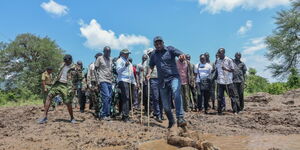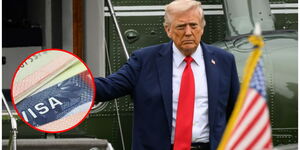The Kenya Navy on Saturday, April 19, announced the successful completion of the Africa-India Key Maritime Engagement (AIKEYME) 2025 exercise held in Dar es Salaam in Tanzania.
The event, which aimed to strengthen regional maritime security and promote cooperation among nations, featured a range of complex drills and operations involving various participating navies.
Significant activities included Visit, Board, Search, and Seizure (VBSS) operations, which were meant to enhance the teams’ capabilities in counter-piracy and maritime interdiction. VBSS operations are maritime military tactics used primarily by naval and coast guard forces to interdict, inspect, and secure vessels at sea.
The process starts with approaching and communicating with a vessel (Visit), followed by physically boarding it (Board). The team then inspects the ship for illegal activity (Search), and if violations are found, they take control and detain suspects (Seizure).
Additionally, Replenishment at Sea (RAS) drills were carried out, aiming to showcase effective logistical coordination and seamless collaboration between vessels. RAS drills are naval exercises where ships transfer fuel, supplies, ammunition, and sometimes personnel while underway, without returning to port. These operations are critical for maintaining fleet endurance and operational readiness during extended deployments.
In a typical RAS drill, two or more ships sail in close formation while specialised equipment, such as fuel hoses or cargo transfer rigs, is used to move supplies between them. There are two main types: Connected Replenishment (CONREP), where ships are physically linked by cables and hoses, and Vertical Replenishment (VERTREP), where helicopters transfer cargo between vessels.
Further, ship manoeuvres were also conducted to demonstrate the tactical skills and readiness of the navies to respond to real-world maritime challenges. These refer to the coordinated movements and positioning of naval vessels during operations, exercises, or transit. Such manoeuvres are crucial for tactical positioning, safety, and maintaining formation, especially in combat scenarios, fleet operations, or confined waters.
Key types include formation manoeuvres, where vessels maintain structured patterns like line ahead or wedge for tactical readiness; tactical turns, used to change direction in response to threats; and station keeping, which involves holding precise positions relative to other ships during operations like Replenishment at Sea. Emergency manoeuvres such as zig-zagging or hard turns help evade collisions or enemy threats, while Man Overboard (MOB) drills involve specific turn patterns to quickly recover lost personnel. These manoeuvres require precise coordination and skilled seamanship.
Approach to Towing (APTOW) drills were also conducted, focusing on maritime towing operations and ensuring that participating ships were capable of providing assistance during operational challenges. These drills train crews on how to safely and effectively connect a tow line between ships, typically when one vessel is disabled or in distress. They simulate real-world scenarios where a ship must be towed due to mechanical failure, battle damage, or fuel depletion.
The process begins with the approach phase, where the towing vessel carefully navigates alongside or ahead of the ship to be towed, maintaining steady speed and distance. Crews then conduct line transfer operations using messenger lines, heaving lines, or boats to pass the towline. Once connected, both ships coordinate speed and course to ensure a stable tow.
Approach to towing drills requires precise ship handling, strong communication, and a good understanding of sea conditions to avoid line breakage, collisions, or capsizing. They're essential for building readiness in fleet support and emergency response situations.
According to the Navy, Kenya Navy Ships (KNS) JASIRI and KNS SHUPAVU, along with the Special Boats Unit (SBU), played pivotal roles throughout the exercise.
“The event highlighted operational excellence and reinforced the collective commitment to safeguarding maritime security in the Indian Ocean,” asserted the maritime forces.
The latest AIKEYME event, which was a five-day event, is part of the broader defence cooperation agreement Kenya signed with India in July 2016. AIKEYME is a significant initiative in safeguarding maritime security in the Indian Ocean and involved the joint cooperation of Kenya, India and Tanzania.












